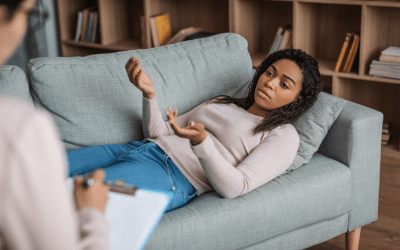
The Link Between Anxiety and Depression: How to Break the Cycle
This post may contain affiliate links, which means we may receive a commission, at no extra cost to you, if you make a purchase through a link. Please see our full disclosure https://www.rachelbutlercounseling.com/disclosure-privacy-policy-terms-of-use/ for further information.
If you have ever struggled with anxiety and depression, you are not alone. Although these disorders are distinct and have their own set of characteristics and diagnostic criteria, they often occur together. In fact, According to the National Alliance on Mental Health (NAMI), 60% of individuals who have an anxiety disorder also experience depression/a depressive disorder, and vice versa [1]. This is called “comorbidity,” and also explains why SSRI medications are often used to treat both anxiety and depression—the two disorders have to do with the same hormone: serotonin. This close relationship between anxiety and depression is not a coincidence, and in this blog post, we will explore the link between these two mental health disorders.
The Anxiety/Depression Cycle:
The relationship between anxiety and depression is complex and different for each individual who experiences it. However, most individuals would likely agree that this cycle is not an easy one to cope with and break.
One possible explanation for the overlap between anxiety and depression is that both disorders involve a dysregulation of the stress response system. This means that those with both anxiety and depression have an exaggerated response to stress leading to maladaptive feelings. Feeling anxious or depressed can be hard to describe, but the exaggerated stress response can result in your body feeling overly nervous and agitated, or isolated and sad.
Another possible explanation is that anxiety and depression share some genetic and environmental risk factors. For example, both disorders are more common in people who have a family history of mental illness [2]. Additionally, those who have experienced a traumatic event are more susceptible to the development of anxiety and depression. An event we all experienced, and may have gained some trauma from, is the Covid-19 pandemic. Study results indicate that research on anxiety and depression stemming from trauma is supported, as the pandemic brought about a 25% increase in anxiety and depression in Americans [3].
Anxiety and depression can also influence each other. For example, people with anxiety may be more likely to develop depression because the constant worry and stress can wear down their ability to cope. Common unhealthy coping mechanisms that come with anxiety, like avoidance, can transform into variables that influence depression, like loneliness. Anxiety can also cause physical symptoms, like headaches, nausea, and insomnia, as well as emotional symptoms, such as fear, worry, and irritability. Over time, this constant state of alertness and worry can wear down a person’s resilience, leading to feelings of hopelessness, helplessness, and, ultimately, depression.
Similarly, people with depression may be more prone to anxiety because they feel helpless and uncertain about the future. They may feel a lack of control over their lives and struggle to find joy in activities that used to be pleasurable. This sense of hopelessness and lack of control can lead to feelings of anxiety. Additionally, the physical symptoms of depression, such as fatigue and insomnia, can exacerbate anxiety symptoms.
This can create an endless cycle and can feel very difficult to overcome. However, there are some things you can do to help break this cycle.
How to Break the Cycle:
There is no quick-fix way to break the cycle of anxiety and depression. It can take months, and even years, for this cycle to break. However, it is an important step toward improving your mental health and overall well-being. Here are some strategies that may be helpful:
- Practice relaxation and mindfulness techniques: Relaxation techniques such as deep breathing, meditation, or yoga can help reduce stress and promote relaxation. Regular practice of these techniques can help you feel more calm and centered, which can in turn help alleviate symptoms of anxiety and depression. Mindfulness is known to keep your mind in the present moment and promote gratitude, which can lead to contentment and eliminate worries and melancholy.
- Exercise regularly: Exercise is an effective way to reduce symptoms of anxiety and depression. Even a small amount of exercise each day, like going on a 15-minute walk or dancing around your house, can help improve mood and increase energy levels.
- Connect with others: Support from others is an important factor in managing symptoms of anxiety and depression. Even if you don’t feel comfortable sharing details about your anxiety and depression, socializing with friends and/or family can help with just taking your mind off things. This can help you get your mind out of a negative space and into a more positive outlook. Make an effort to connect with friends, family, or a support group, and try to engage in activities that you enjoy.
- Practice self-care: Prioritizing self-care can help reduce stress and improve mood. This may include activities such as taking a relaxing bath, reading a book, journaling, or practicing a hobby. Think back about what self-care activities you enjoy but haven’t done in a while, and try it out!
- Seek professional help: If you are experiencing symptoms of anxiety or depression, it’s important to seek professional help from a mental health professional. They can help you identify the root causes of your symptoms and develop a personalized treatment plan to address them.
To discuss how therapy could help you during this season of your life, please contact me or schedule your free 15 minute consultation.
Want to read more? Here are a few of my related blog posts you may be interested in checking out!




0 Comments